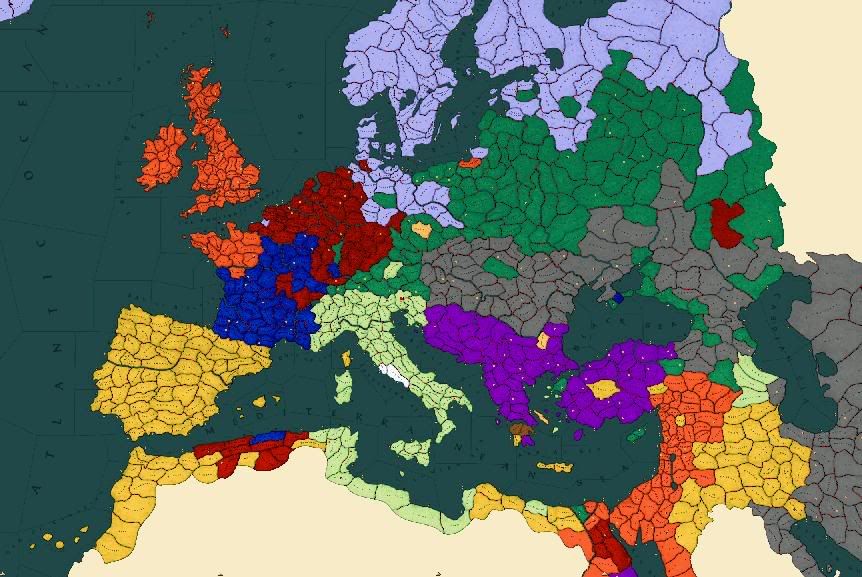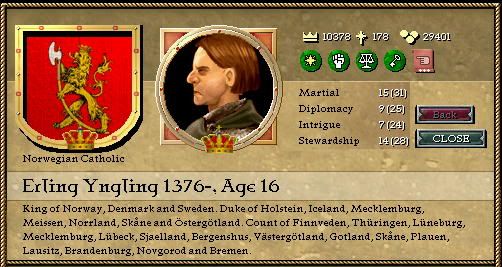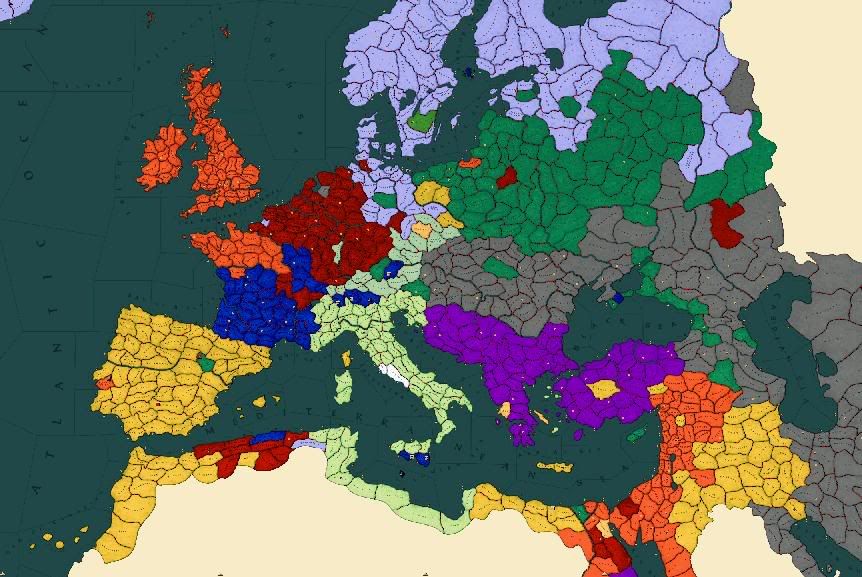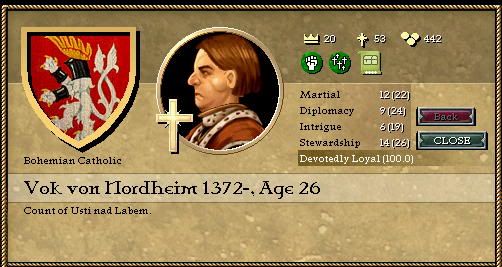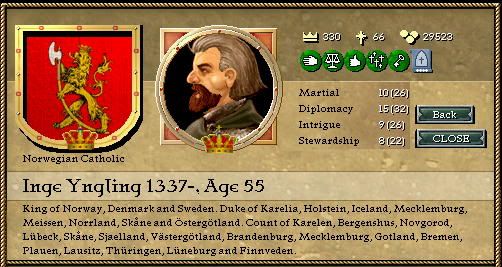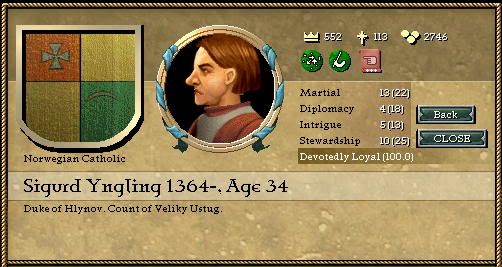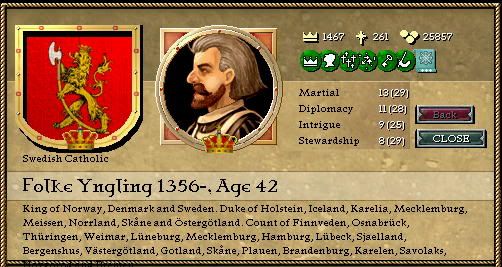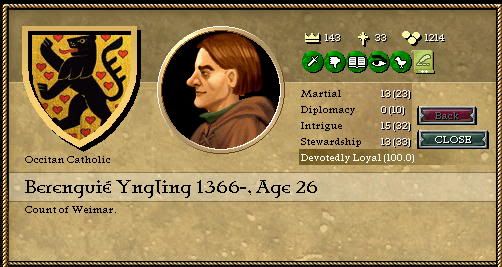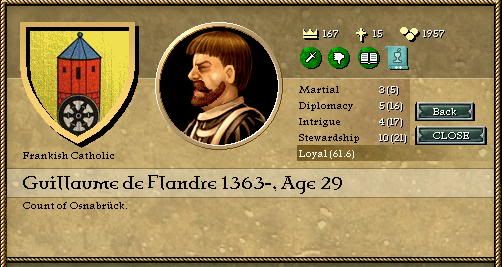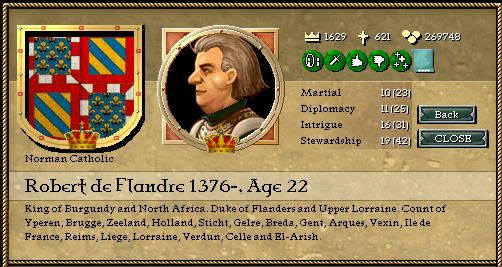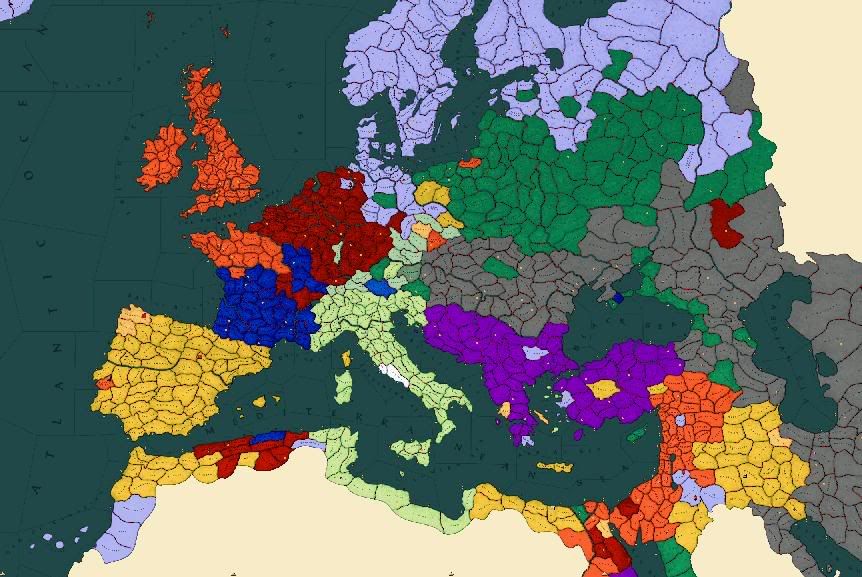YNGLINGA SAGA
79. KING HÅKON'S LEGACY
Now the saga must for a moment turn out of the sequence of things, and tell of events that came to pass somewhat after the battles told of thus far. For while King Håkon lay on his deathbed, he called to himself Tryggve his bishop, and said that he wished to make a will. And as this tale has a great bearing on what happened in Poland in these years, it is best if it is told first.
These then are the words of King Håkon : "You will remember that while we were campaigning in Germany, there came to us an emissary from King Sieciech, and we all agreed that there was naught to do but submit; but that night I had a dream, and in the morning I ordered that the trells should be armed, and the struggle continue, for Olaf Halkjellson had spoken to me. Then I did not speak the whole truth of that dream, for I feared lest my soldiers should be disheartened. But now that danger is past, and I can instruct my sons with a clear mind."
"Here then is the fullness of my dream : King Olaf spoke to me, and he said 'This is a hard hour for Norway; but my time is not yet, if you have the true heart of an Yngling.' Then I replied 'I think my heart is as strong as any man's; but tell me now how we may gain the victory here.' King Olaf smiled upon me, and said 'The sacrifice of a King is powerful seid'. He said nothing more, but I took his meaning; it seemed to me then that a long time passed, but he did not grow impatient, and at last I nodded. Then he laid his hands upon my head, and blessed me; and I felt a great strength come upon me; and so I woke and gave King Sieciech a strong word for his master, and how that ended you well know."
"Now my bane comes upon me; but before I join King Olaf in the halls of Dovre, I will lay this upon my sons, and upon all the Ynglings : Because theirs is the power and the glory of kingship, theirs also must be the burden, and always they must be ready to give sacrifice for the land."
These words were King Håkon's last; they are engraved upon his tomb in the Nidaros Dome, and all Ynglings make pilgrimage there at least once in their lives, and kneel before the tomb and swear an oath always to serve Norway.
80. OLAF HALKJELLSON AIDS HIS KINSMAN
Now while the trells were gathering in the North to fight for their freedom, the spirit of Olaf Halkjellson went South, to the lands where he had won victories in life. There he found the place where Sieciech Piast held camp; and he went to the sleeping King's ear all unseen, and whispered that Norway was beaten, and it was time to turn south and defeat the Italians. Thus when the King awoke, he gave orders that the Poles should break camp and march to the Alps, and not pursue the Norwegians as they retreated across the Sound.
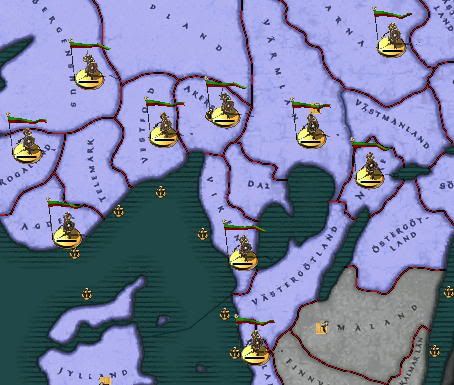
Opp, all jordens bundne treller!
Opp I, som sulten knuget har!
But in this wise King Håkon was given time to muster his armies anew, and put new heart in them; and his host swelled with the addition of the trells, strong and bitter men whose eyes blazed with the promise of freedom, and with rage against any who would stand in their way. Then the King crossed once more the Sound at the head of a vast fleet of dragon-ships, and he fell upon the armies laying siege to Mecklenburg and defeated them, and marched up the coast relieving all the cities there, and swiftly retaking those where the Poles had left garrisons. In this enterprise those men who had been trells were of the greatest aid to him, for there was no work so hard that they would not undertake it, and they fought with the wild ferocity of those who have been whipped all their lives. "With a hundred of these men", said Håkon, "I would storm the gates of Hell." And when a thousand fell in the storm of Brandenburg, the bitter jest ran that the Polish soldiers were more blackhearted than the hosts of Lucifer. But however black their hearts, they were no match for the rage of the trell-host of Norway; and soon the German lands were clear of foes.
Then Håkon entered the Piast domain, and burned the farms and harried the people. It was said that the trells showed no mercy to man, woman, or beast, and that where they had gone, there was no house unburnt, nor virgin unravished, for three days' march around. For when men are released from the bonds of long oppression, their first desire is revenge, and they are none too choosy about whom it falls upon. Nor did Håkon try to moderate them; for he said "Let the Poles fear us, and not make war in our lands again; if they would be safe, let them stay at home." And in this wise many rich districts were laid bare.
81. THE SIEGE OF KRAKOW
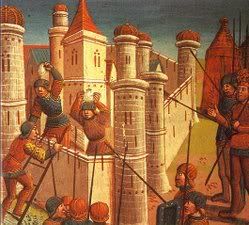
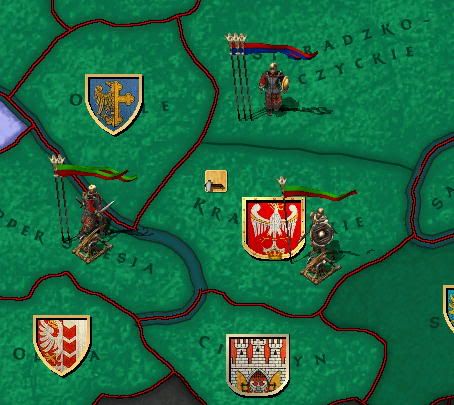
The Vistula flows through the broad plains of Poland; and near its source lies the great fortress-city of Krakow, where the Piast Kings hold their court. Now in the spring of the fourth year of the war King Håkon came to this city with his army. At first he thought to take it by storm, in the same way that he had taken other cities in Poland; but when he saw the height of the walls, and how thichkly the Krakowskie-men held them, he ordered instead that a great mound of earth be thrown up around the city, and a siege begun. Then he sent heralds to the burghers, offering to spare their city if they would give him bread, salt, and gold; but believing that their King would soon return to their relief, the council of the city refused him, and sent the heralds back empty-handed. "Well," said Håkon, "if not honey, then vinegar"; and he began the construction of many wheeled towers that could each hold a hundred men, and great stone-slingers, and other such engines of war.
On the thirtieth day of the siege all was ready, and the towers began to roll forwards. The men of Krakow had not been idle, and their engines fired great stones and barrels of burning tar at the towers, and many were destroyed; in this wise many died. But the living were spurred to greater effort by the death cries of their comrades, and soon the towers were at the walls; then the trells of Norway rushed out along the bridges, and fell upon the Krakowskie-men; and there was much hard fighting done. But the Poles warded themselves well, and many Norwegians fell under their swords; and in the end they could not force the walls. This was the first time a city had held against the storm of the trell-host, and there was much rejoicing in Krakow; but King Håkon merely said "It is not the first blow that settles a fight" ; and he ordered strong wine to be distributed among his men, so they could drink to their fallen comrades.
The next day, King Håkon ordered that birds of all kinds should be brought to him; and the army therefore captured a great many pigeons, ravens, doves, eagles, and crows, and brought them to King Håkon, who put them in cages, each according to their kind. The next day also, and the third, went by in this manner; and men wondered if grief for the storm-fallen had bent the King's mind. But on the fourth day Håkon ordered that each bird should have a twig tied to its foot, and the twig set afire; and then the birds were released, to fly with the wind over Krakow. In this manner a great many fires were begun within the fortress-city, and hundreds died, for the men dared not leave their posts on the walls, and so only women and children were left to fight the flames. But when the fires burned out, the walls remained strong; and the people of Krakow flocked to their stone-built churches, that stood tall among the ashes, and wept for their homes. But still they did not surrender. For the Poles prize above all things odwaga, which in our tongue means courage.
Now King Håkon ordered that the Vistula should be diverted, so that it would no longer flow through Krakow and give the inhabitants water; and for a month men dug trenches and hauled rocks, to dam a river mightier than any found in Norway. But when the work was done it was found that Krakow had many natural wells and springs, and also the rains fell heavily on the Polish plain that summer. So this scheme came to naught, and many in the Norwegian host began to grumble that they had not marched to Poland to bear spades, but arms.
Now there happened that which King Håkon feared the most : Disease broke out among his host, and each day many men died. The dead were flung by the great stone-throwers over the walls of Krakow, and soon besieger and besieged suffered equally; but as the men of Norway slept in tents and under blankets, while those of Krakow found shelter in churches and in the houses of the rich - for all the burghers of Krakow had opened their houses to the poor whose homes had burnt - the Norwegians had the worse of it.
As the siege had continued for many months, and winter was coming on, men grew discouraged, and said that Krakow was impregnable; for no army in living memory had set foot within its gates. But now it happened that a young Yngling boy, who was named Skofte, and had followed his father Harald to the wars, came before Håkon and asked, "What reward would you give, Sire King, to the man who could lead you inside Krakow's walls?" Then the King replied, "To such a man I would give five golden armrings, and as much rich farmland as two strong oxen can plow in a day and a night. But one who made such a claim had best be right, or he would find that I deal harshly with poor jesters." Skofte then said, "Follow me, Sire King, and you shall see whether I jest or not"; and he led the Håkon to a place where an ancient sewer came out of Krakow. It had been made in olden times to cover over a stream that flowed out of the city, and forgotten long since; but it was large enough that a man could walk in it, if he did not stand up straight.
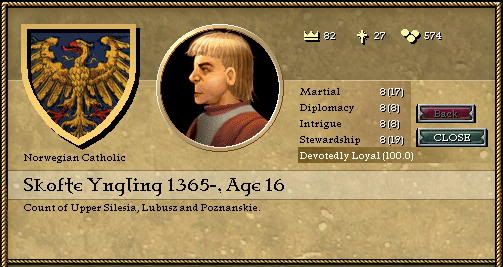
Young Skofte. I aged him artificially by a quick edit to make this picture, hence the complete lack of traits. I have no doubt he'll grow up sneaky, deceitful, selfish and cruel, though - after all, at the tender age of four, he gave over an entire city to the sack, merely to enrich himself.
At this King Håkon was most pleased, and gave Skofte the five golden rings he had promised, and a good sword besides; and he picked a hundred men from among the smaller and more vicious trells, and led them into the tunnel, while the rest of his army stood ready for attack. In this way they came upon the Poles guarding the North Gate all unsuspecting, and slew them, and opened the gates to the Norwegian army. But before the trells could seize the gate, the Poles realised their danger, and rushed to defend their homes, and there was much hard fighting; and in this battle King Håkon was wounded in the groin. But his picked men held the gate open, and the Norwegian host rushed in, and sacked the city. No quarter was given, for that the burghers had not surrendered when summoned, and also because the Norwegians were tired with long fighting and angry with many deaths. No male over twelve was spared. The churches where the women flocked for refuge were pulled down over their heads, and many were killed; the ones who survived were ravaged and led off to slavery. The chalices and icons were pulled from the ruins, and many a trell found himself a wealthy man after this; for Krakow had been the wealthiest city in Poland.
82. PEACE OF SALZBURG
Now when news of his reached King Sieciech, he wept and tore his hair, and sent heralds to Håkon to beg his terms for peace, so that the cities of Poland should be spared the fate of Krakow; for his campaigns in the south had not gone well, and the armies of Poland were dispirited and few in number. Håkon then replied : "We have seen what comes of haughty pride and great demands, so we shall be merciful. Let Sieciech give us rule of Silesia, and we shall say no more of this war"; and to this Sieciech gladly agreed. Håkon then gave Silesia to young Skofte, as he had promised; and later that Yngling had from his grandfather two Polish counties, Lubusz and Poznanskie, which thereby came into Norwegian rule. For this reason Skofte, and also by reason of his finding the sewer entrance into Krakow, Skofte had much favour from King Håkon.
(And before you ask, no, I assassinated nobody to bring this about. The count of Lubusz' son died quite naturally of a severe wound, apparently acquired in battle.)
83. DEATH OF KING HÅKON
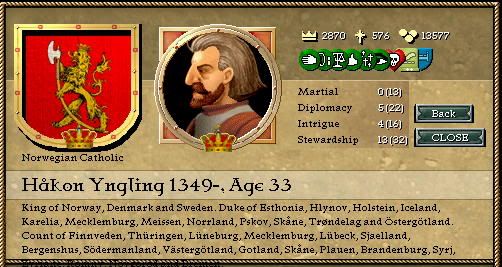
King Håkon's last days.
But now it came to pass as King Olaf had said : King Håkon was taken by the plague, and could not leave his bed; and his wound, that he had gotten in the battle for Krakow's gate, pained him greatly, so he became delirious and cried out for his mother. In this state he could take no nourishment, and grew thin and weak; and all over Norway the Ynglings began to travel to Bergen, to hold Ting for a new King's election.
As the end neared, the King's fever broke, and he became clear-headed once more, though very weak; and he told his will for the future, as we have recounted already. But this last effort exhausted him; and he spoke no further, though he lingered on for another day and a night. When he died, three masses were said for his soul, and he was buried under the Nidaros Dome; there he sleeps still, watching over the Ynglings to hold them to his oath.
Here ends the saga of Håkon Eysteinsson Yngling.
(OK, he is strictly speaking not dead yet; but the plague is pretty certain for a man his age. Anyway, it just seems fitting.)
Europe in 1382 :
